Itinerary
Venice is a city unlike any other. No matter how often you’ve seen it in photos and films, the real thing is more dreamlike than you could imagine. With canals where streets should be, water shimmers everywhere. The fabulous palaces and churches reflect centuries of history in what was a wealthy trading center between Europe and the Orient. Getting lost in the narrow alleyways is a quintessential part of exploring Venice, but at some point you’ll almost surely end up in Piazza San Marco, where tourists and locals congregate for a coffee or an aperitif.
Day itinerary:
No other sea approach in the Adriatic raises goose bumps like Venice, a small ship exclusive where the entire city and its lagoon are a UNESCO World Heritage Site. On your luxurious home-away-from home, you arrive already equipped with a sense of what it’s like to live in the city that’s neither land nor water. Add your own sigh to the Bridge of Sighs, sip a spritz al bitter as you plot your agenda, and let the water taxis do your navigating unless you don’t mind getting lost. Not such a bad prospect, with serendipitous discoveries around every corner.
One of the true jewels of the Mediterranean, Rovinj is a jaw-droppingly beautiful town, which juts out into sparkling Mediterranean. Dominated by the pencil-like bell tower of the Venetian Saint Euphemia Cathedral, pine tree forests flow to the borders of the quaint Old Town – which evokes the romantic, tangled backstreets of the Venice. Rovinj – or Rovino in Italian – is a city of split personalities, with two official languages – having been owned by the Kingdom of Italy between 1919 and 1947.
Day itinerary:
The lovely fishing port of Rovinj on the west coast of the Istrian peninsula bordered on three sides by the Adriatic Sea. You can tour the maze of cobblestone streets that lead to the hilltop St. Euphemia Cathedral with its towering steeple dominating the skyline. Old Town Rovinj is a delightful tangle of medieval streets and twisting stairways. Seek out the Bronze Age ruins of Monkodonja, the hidden beaches or the breathtaking natural beauty of the 6-mile-long Lim Fjord.
Split’s ancient core is so spectacular and unusual that a visit is more than worth your time. The heart of the city lies within the walls of Roman emperor Diocletian’s retirement palace, which was built in the 3rd century AD. Diocletian, born in the nearby Roman settlement of Salona in AD 245, achieved a brilliant career as a soldier and became emperor at the age of 40. In 295 he ordered this vast palace to be built in his native Dalmatia, and when it was completed he stepped down from the throne and retired to his beloved homeland. Upon his death, he was laid to rest in an octagonal mausoleum, around which Split’s magnificent cathedral was built.In 615, when Salona was sacked by barbarian tribes, those fortunate enough to escape found refuge within the stout palace walls and divided up the vast imperial apartments into more modest living quarters. Thus, the palace developed into an urban center, and by the 11th century the settlement had expanded beyond the ancient walls.Under the rule of Venice (1420–1797), Split—as a gateway to the Balkan interior—became one of the Adriatic’s main trading ports, and the city’s splendid Renaissance palaces bear witness to the affluence of those times. When the Habsburgs took control during the 19th century, an overland connection to Central Europe was established by the construction of the Split–Zagreb–Vienna railway line.After World War II, the Tito years saw a period of rapid urban expansion: industrialization accelerated and the suburbs extended to accommodate high-rise apartment blocks. Today the historic center of Split is included on UNESCO’s list of World Heritage Sites.
Day itinerary:
Split welcomes you with open arms, Mediterranean style, and a bustling harbor lined with busy cafés. Beyond, looms stately Diocletian’s Palace a UNESCO World Heritage Site in the center of town. Within the palace walls, a majestic cathedral soars, surrounded by polished marble streets lined with every type of tempting shop. If you’re longing for a quiet respite, head for the western end of town for an easy stroll through a verdant mountain park. Or take an optional tour to Trogir, another UNESCO site.
Nothing can prepare you for your first sight of Dubrovnik. Lying 216 km (135 miles) southeast of Split and commanding a jaw-dropping coastal location, it is one of the world’s most beautiful fortified cities. Its massive stone ramparts and fortress towers curve around a tiny harbor, enclosing graduated ridges of sun-bleached orange-tiled roofs, copper domes, and elegant bell towers. Your imagination will run wild picturing what it looked like seven centuries ago when the walls were built, without any suburbs or highways around it, just this magnificent stone city rising out of the sea.In the 7th century AD, residents of the Roman city Epidaurum (now Cavtat) fled the Avars and Slavs of the north and founded a new settlement on a small rocky island, which they named Laus, and later Ragusa. On the mainland hillside opposite the island, the Slav settlement called Dubrovnik grew up. In the 12th century the narrow channel separating the two settlements was filled in (now the main street through the Old Town, called Stradun), and Ragusa and Dubrovnik became one. The city was surrounded by defensive walls during the 13th century, and these were reinforced with towers and bastions in the late 15th century.From 1358 to 1808 the city thrived as a powerful and remarkably sophisticated independent republic, reaching its golden age during the 16th century. In 1667 many of its splendid Gothic and Renaissance buildings were destroyed by an earthquake. The defensive walls survived the disaster, and the city was rebuilt in baroque style.Dubrovnik lost its independence to Napoléon in 1808, and in 1815 passed to Austria-Hungary. During the 20th century, as part of Yugoslavia, the city became a popular tourist destination, and in 1979 it was listed as a UNESCO World Heritage Site. During the war for independence, it came under heavy siege. Thanks to careful restoration, few traces of damage remain; however, there are maps inside the Pile and Ploče Gates illustrating the points around the city where damage was done. It’s only when you experience Dubrovnik yourself that you can understand what a treasure the world nearly lost
Day itinerary:
While larger ships must pass by, we anchor right beyond the famous walled city so you can admire its beauty with every glance. Tender ashore and step right into Old Town, a UNESCO site where no cars are allowed, just eons of history. Capture the exhilarating views on your camera — and in your memory. End your day at the Buza Café (if you can find it) watching bold divers leap off the cliffs into the crystalline sea.
Backed by imposing mountains, tiny Kotor lies hidden from the open sea, tucked into the deepest channel of the Bokor Kotorska (Kotor Bay), which is Europe’s most southerly fjord. To many, this town is more charming than its sister UNESCO World Heritage Site, Dubrovnik, retaining more authenticity, but with fewer tourists and spared the war damage and subsequent rebuilding which has given Dubrovnik something of a Disney feel.Kotor’s medieval Stari Grad (Old Town) is enclosed within well-preserved defensive walls built between the 9th and 18th centuries and is presided over by a proud hilltop fortress. Within the walls, a labyrinth of winding cobbled streets leads through a series of splendid paved piazzas, rimmed by centuries-old stone buildings. The squares are now haunted by strains from buskers but although many now house trendy cafés and chic boutiques, directions are still given medieval-style by reference to the town’s landmark churches.In the Middle Ages, as Serbia’s chief port, Kotor was an important economic and cultural center with its own highly regarded schools of stonemasonry and iconography. From 1391 to 1420 it was an independent city-republic and later, it spent periods under Venetian, Austrian, and French rule, though it was undoubtedly the Venetians who left the strongest impression on the city’s architecture. Since the breakup of Yugoslavia, some 70% of the stone buildings in the romantic Old Town have been snapped up by foreigners, mostly Brits and Russians. Porto Montenegro, a new marina designed to accommodate some of the world’s largest super yachts, opened in nearby Tivat in 2011, and along the bay are other charming seaside villages, all with better views of the bay than the vista from Kotor itself where the waterside is congested with cruise ships and yachts. Try sleepy Muo or the settlement of Prčanj in one direction around the bay, or Perast and the Roman mosaics of Risan in the other direction.
Day itinerary:
This is one of Montenegro’s most beautiful bays, and the approach offers one breathtaking fjord-like view after another. Just when you’ve reached your fill of blues and greens, the bright red rooftops of the medieval Old Town come into view. The entire area has been proclaimed a UNESCO World Heritage Site. The charming streets of Old Town remain car free, filled with 12th century Baroque palaces and Romanesque churches. For a fresh perspective, climb to the fortress on the hill for a breathtaking vista.
Day itinerary:
Today you’ll discover one of Sicily’s jewels, the charming village of Giardini Naxos, nestled in one of the world’s most beautiful bays. An optional excursion to the popular hillside town of Taormina will be a highlight of your voyage — from the stunning setting of the iconic Greek Theater to the sparkling beaches along the Ionian Sea. Take a more adventurous tack and explore the UNESCO site of Mount Etna, Europe’s most active volcano.
Sorrento may have become a jumping-off point for visitors to Pompeii, Capri, and Amalfi, but you can find countless reasons to love it for itself. The Sorrentine people are fair-minded and hardworking, bubbling with life and warmth. The tuff cliff on which the town rests is spread over the bay, absorbing sunlight, while orange and lemon trees waft their perfume in spring. Winding along a cliff above a small beach and two harbors, the town is split in two by a narrow ravine formed by a former mountain stream. To the east, dozens of hotels line busy Via Correale along the cliff—many have “grand” included in their names, and some indeed still are. To the west, however, is the historic sector, which still enchants. It’s a relatively flat area, with winding, stone-paved lanes bordered by balconied buildings, some joined by medieval stone arches. The central piazza is named after the poet Torquato Tasso, born here in 1544. This part of town is a delightful place to walk through. Craftspeople are often at work in their stalls and shops and are happy to let you watch; in fact, that’s the point. Music spots and bars cluster in the side streets near Piazza Tasso.
Day itinerary:
UNESCO World Heritage Sites abound in Sorrento. Optional tours will take you to the archaeological areas of Pompeii and Torre Annunziata, or the 4th century B.C. city of Herculaneum. Perhaps your choice will be a boat ride to Positano, the legendary home of the Sirens. Perched on a terrace on the spectacular Amalfi Coast, Sorrento offers exceptional views of the Bay of Naples and Mount Vesuvius.
Rome, Italy, the Eternal City, is a stunning blend of ancient history and vibrant modern life. Iconic landmarks like the Colosseum, Vatican City, and the Pantheon showcase its glorious past. Cobblestone streets lead to charming piazzas, bustling markets, and world-renowned museums. Rome’s culinary scene delights with traditional Italian cuisine and lively cafes. The city’s rich culture, impressive architecture, and warm, welcoming atmosphere make it an unforgettable destination for travellers.
Day itinerary:
In this enchanting city the past and present intersect in perfect harmony. Casually intermingled among ancient ruins and majestic cathedrals are the trappings of a modern metropolis: Skyscrapers,cafes, boutiques selling designer footwear. But of course what you seek first in the heart of Rome is its breathtaking history. A good place to begin is the Vatican, with its Sistine Chapel and St. Peter’s Basilica. Works by Bernini, Michelangelo, Caravaggio, and Raphael are just a few of those on display, any one of which is worth hours of contemplation. Then the ancient ruins—Colosseum, Forum, Circus Maximus. And of course the Trevi Fountain for the obligatory coins promising your return to the Eternal City.
At first glance, it’s hard to imagine that this resort destination was one of the world’s great naval powers, and a sturdy rival of Genoa and Pisa for control of the Mediterranean in the 11th and 12th centuries. Once the seat of the Amalfi Maritime Republic, the town is set in a verdant valley of the Lattari Mountains, with cream-colored and pastel-hued buildings tightly packing a gorge on the Bay of Salerno. The harbor, which once launched the greatest fleet in Italy, now bobs with ferries and blue-and-white fishing boats. The main street, lined with shops and pasticcerie, has replaced a raging mountain torrent, and terraced hills flaunt the green and gold of lemon groves. Bearing testimony to its great trade with Tunis, Tripoli, and Algiers, Amalfi remains honeycombed with Arab-Sicilian cloisters and covered passages. In a way Amalfi has become great again, showing off its medieval glory days with sea pageants, convents-turned-hotels, ancient paper mills, covered streets, and its glimmering cathedral.
Day itinerary:
The town of Amalfi lies at the mouth of a deep ravine surrounded by dramatic cliffs and coastal scenery. As part of the Amalfi Coast, it has been designated a UNESCO World Heritage Site and is an important tourist destination. The whole region is famed for its lemons, which are about double the size of other lemons, and the production of the limoncello liqueur. An optional tour can take you to the UNESCO archaeological areas of Pompeii, Positano and Ravello.
Day itinerary:
Vibo Valentia, situated in the Calabria region of southern Italy, is a captivating destination rich in history and natural beauty. Perched on a hilltop, the town offers stunning views of the Tyrrhenian Sea and the surrounding landscape. Norman-Swabian Castle, home to the State Archaeological Museum, showcases artifacts from the ancient Greek city of Hipponion. The town is characterized by charming streets, vibrant piazzas, and notable churches like the Santa Maria Maggiore. Nearby, the scenic Capo Vaticano offers stunning coastline views with rugged cliffs and pristine beaches.
Day itinerary:
Reggio Calabria is a small ship exclusive port located at the tip of Italy’s “boot”. Known for its stunning seaside promenade, Lungomare Falcomata, it offers beautiful views of Sicily across the Strait of Messina. Key attractions include the National Archaeological Museum, home to the famous Riace Bronzes, and the Aragonese Castle. Additionally, Reggio Calabria is renowned for its rich culinary scene and features specialties such as ‘nduja’. This unique soft, spreadable, and spicy sausage is made with a blend of local chili peppers. Traditionally, nduja is served on crispy bread and fresh pasta.
Day itinerary:
Taranto, located in the Puglia region of Italy, charms with its historic district featuring Greek ruins and a labyrinth of narrow streets. The Aragonese Castle and the 11th-century Cathedral of San Cataldo highlight its historic charm. Taranto is famous for its two seas, the Mar Grande and Mar Piccolo, which define its unique geography and provide beautiful beaches with sandy shores for sunbathing. Taranto is also known for its Puglian cuisine, featuring orechiette pasta, mussels, tarali (traditional biscuits), and local wines such as Primitivo and Negroamaro.
Located right in the heel of the Italian boot, Otranto’s scenic landscape often plays the protagonist in displaying the beauty of Puglia, Italy’s easternmost region. Facing the Adriatic sea, the seducing weather and pristine waters have made it a popular destination where on a clear day, wanderers can see the coast of Albania. Like much of Italy, the city boasts a rich and mixed history. Once a Greek and Roman port, it was later occupied by the Byzantines, the Normans and the Spanish before the Ottoman invaded in during their Jihad to conquer Europe. Remains of forts are still visible and are a living testimonial of the town’s rich history along with Otranto’s cathedral, which still encloses today the relics of martyrs who refused to convert to Islam.
Day itinerary:
This small ship exclusive port has a mix of beautiful beaches and gorgeous landmarks. The town’s main attraction is the Otranto Cathedral, famous for its intricate 12th-century mosaic floor, rose windows, and the Chapel of the Martyrs. The nearby beaches, like Baia dei Turchi, are renowned for their crystal-clear waters, perfect for an afternoon swim.
Day itinerary:
Rab, a small ship exclusive port, is a picturesque island located in the northern Adriatic Sea, renowned for its stunning natural beauty and rich cultural heritage. The island’s charm lies in its medieval old town, characterized by narrow cobblestone streets, ancient city walls, and Romanesque churches. Rab Town, the island’s main settlement, is famous for its four distinctive bell towers, particularly the striking Bell Tower of the Cathedral of St. Mary. The island offers many beautiful beaches with sandy covers and crystal-clear waters. Visitors can enjoy various outdoor activities like hiking, cycling, and water sports. The island’s lush landscapes and pristine environment provide a perfect backdrop for nature enthusiasts.
Venice is a city unlike any other. No matter how often you’ve seen it in photos and films, the real thing is more dreamlike than you could imagine. With canals where streets should be, water shimmers everywhere. The fabulous palaces and churches reflect centuries of history in what was a wealthy trading center between Europe and the Orient. Getting lost in the narrow alleyways is a quintessential part of exploring Venice, but at some point you’ll almost surely end up in Piazza San Marco, where tourists and locals congregate for a coffee or an aperitif.
Day itinerary:
No other sea approach in the Adriatic raises goose bumps like Venice, a small ship exclusive where the entire city and its lagoon are a UNESCO World Heritage Site. On your luxurious home-away-from home, you arrive already equipped with a sense of what it’s like to live in the city that’s neither land nor water. Add your own sigh to the Bridge of Sighs, sip a spritz al bitter as you plot your agenda, and let the water taxis do your navigating unless you don’t mind getting lost. Not such a bad prospect, with serendipitous discoveries around every corner.
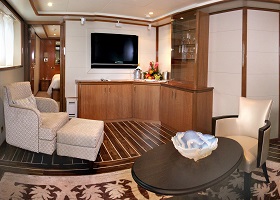
The ultimate in space and style surrounds you in 495 square feet of pure indulgence. Separate bedroom and living room with an in-suite dining area is an invitation to relaxation. And possibly best of all, your expansive bathroom features both a whirlpool spa tub and a massage shower.
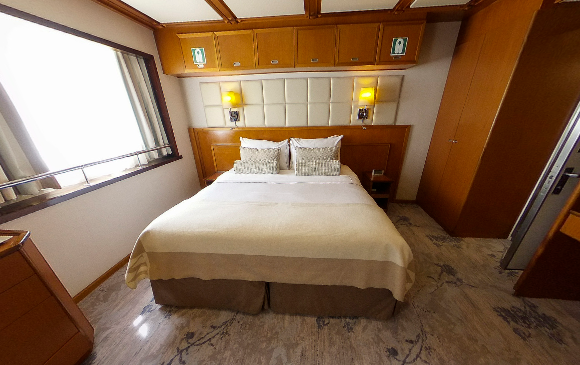
For the ultimate in nautical experiences, reserve the new Officer’s Suite located close to the Bridge where our own ship’s officers have their quarters. With its unique “insider” location and 242 square feet of comfort, the nautically appointed Officer’s Suite offers an experience you won’t find on any other cruise line.
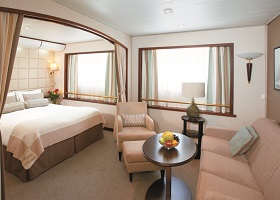
With 376 square feet, you’ll find the perfect space for time together — and plenty of room for time to yourself. You’ll even enjoy two full separate bathrooms. All the amenities of the staterooms await you, plus a beautiful sitting area, and two flat-screen television sets with DVD players.
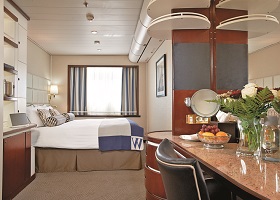
Stylish comfort and ocean views welcome you in 188 square feet of beautifully designed comfort. Your queen bed (which can be separated as twins if you prefer) is swathed in luxurious Egyptian cotton linens. Before or after you enjoy an invigorating massage shower with soothing L’Occitane® bath products, wrap up in your waffle-weave robe, have a snack from the fresh fruit bowl, or simply stretch out and smell the flowers.
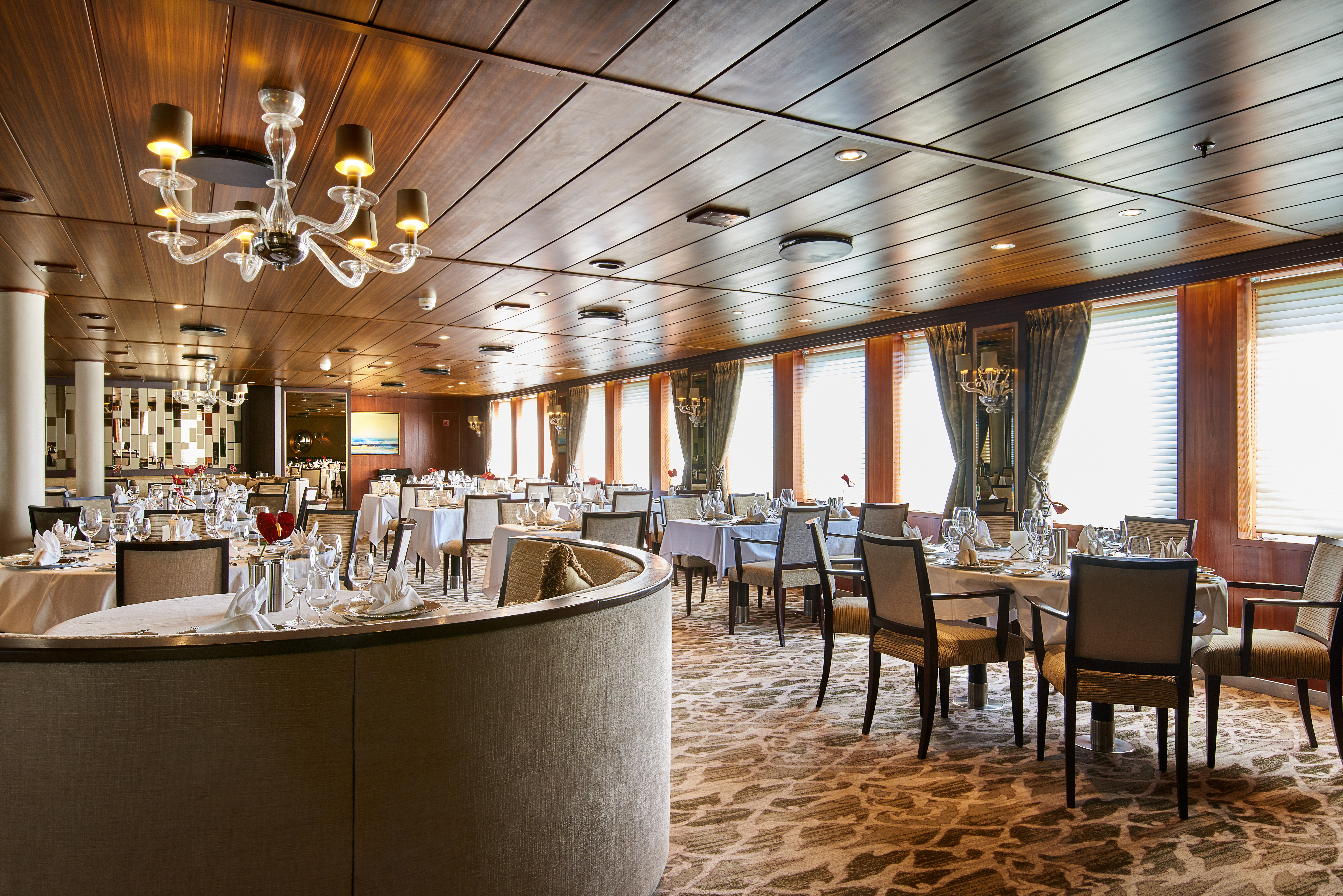
Here, the dining room manager seats you, but where is your decision. There are no pre-assigned tables or first or second seatings. When you dine and with whom are entirely up to you. Seating usually begins at 6:30 p.m. and will be printed in the ship’s daily program. Each delightful dish is prepared exactly to your liking – an exquisite dinner served course-by-course with a fine selection of vintage wines.

Treat your palate to the French-inspired café cuisine of Stella Bistro, Wind Surf’s alternative restaurant. You’ll find delightfully indulgent desserts and a wonderful array of wines specifically paired to the meal.
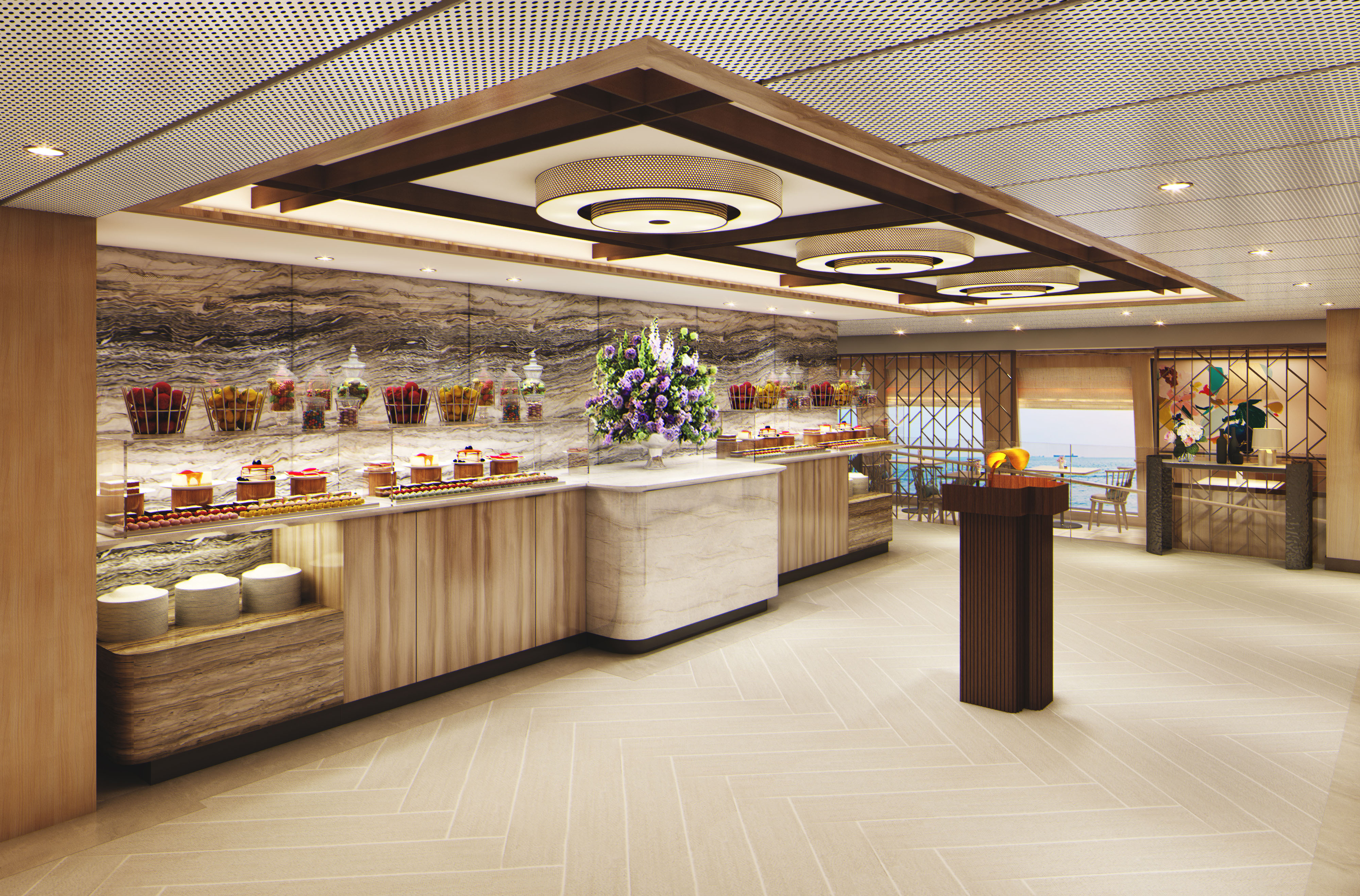
It’s breakfast alfresco, full service or buffet-style, anytime till 9:30 a.m. No need to hurry. Again, the choices are many in Veranda. Choose the sumptuous, seemingly endless buffet. Or, order from the lunch menu between noon and 2:30 p.m.

Have you ever wanted to learn about rowing across the Atlantic or the inner workings of the Monte Carlo Grand Prix? On select Windstar voyages, satisfy your curiosity and enhance your understanding of the local culture by listening to our onboard lecturers. We’ve curated a group of speakers designed to bring you an insider’s perspective on a multitude of intriguing topics. Listen raptly as your voyage becomes more than just a vacation – and a thought-provoking exploration of enchanting lands.
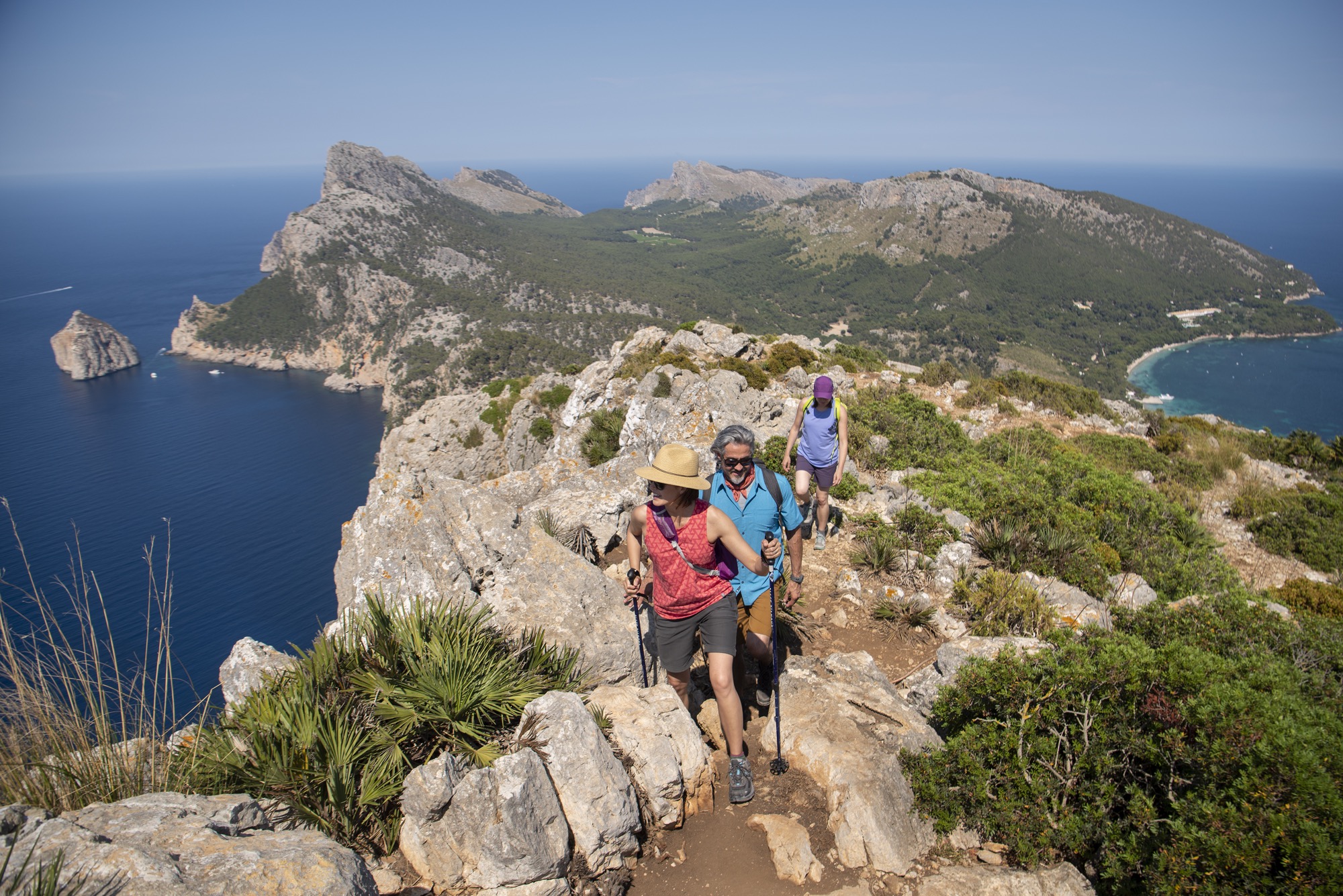
Windstar Signature Expeditions is an immersive program that features 8 expert guides who stay on board throughout the voyage, giving informative talks and taking guests on optional adventures by foot, by kayak, or by Zodiac boat – sometimes launching straight from the ship in remote places like Misty Fjords and Kenai Fjords. It’s Alaska at its most authentic, exciting all your clients’ senses to its magnificence.
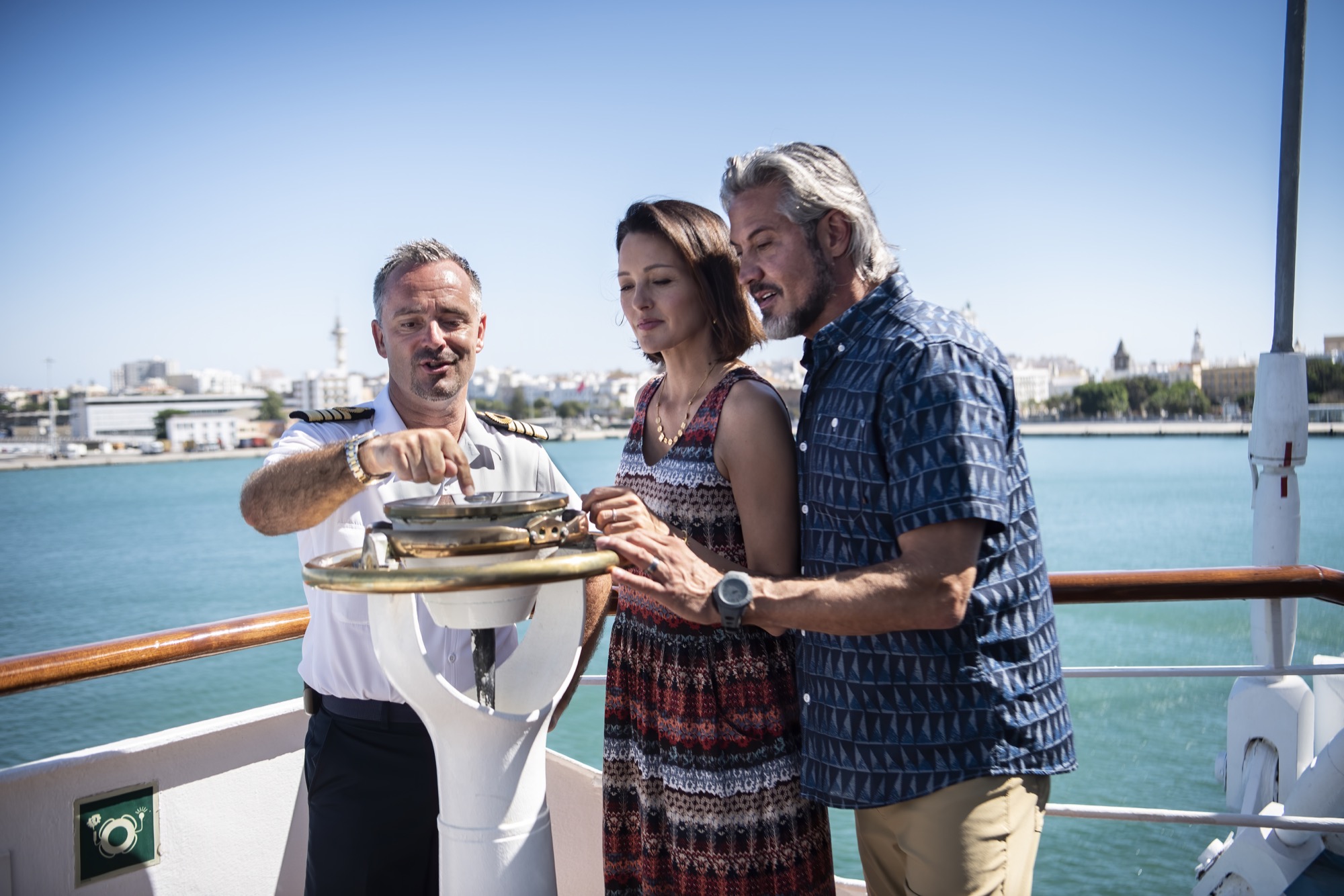
Delight your palette with onboard cooking demonstrations featuring James Beard Foundation chef recipes. From wild striped bass with tomato sage “fondue” to lobster risotto, our Windstar chefs will take your taste buds on a journey through local cuisine. For a special tantalizing treat, join Windstar on one of our voyages in the James Beard Foundation Culinary Cruise Collection, where a James Beard Foundation chef will show you how to elevate your own culinary skills. It’s a taste of enrichment you’ll never forget.
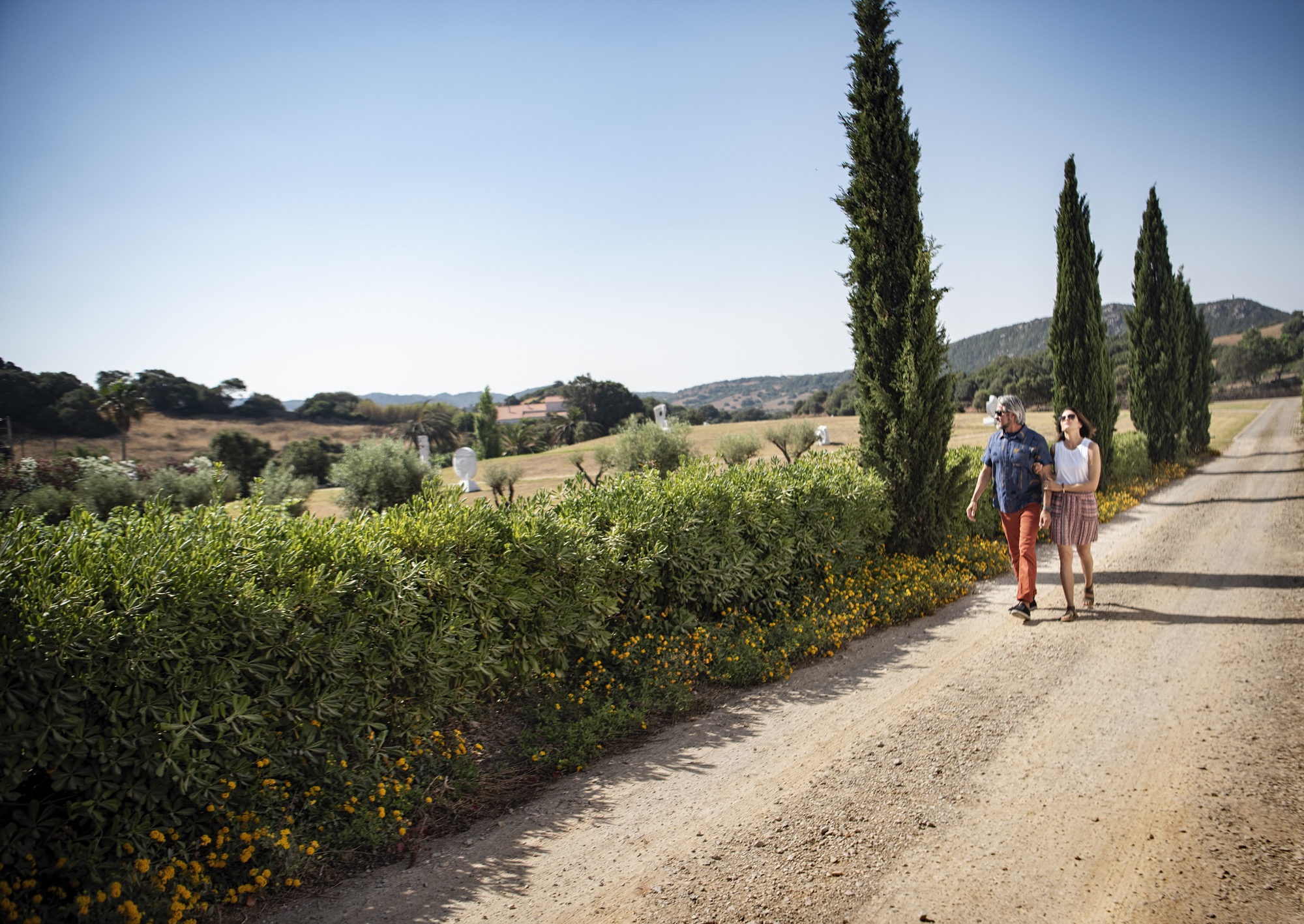
Wine tastings, SCUBA diving, tours with locals and more — Windstar offers a variety of unique excursions that will add more depth and immersion to every day of your journey. Each meticulously planned excursion meets our highest standard of quality in safety and professionalism. Ensure your peace of mind knowing that you’ll always make it back to the yacht on time.
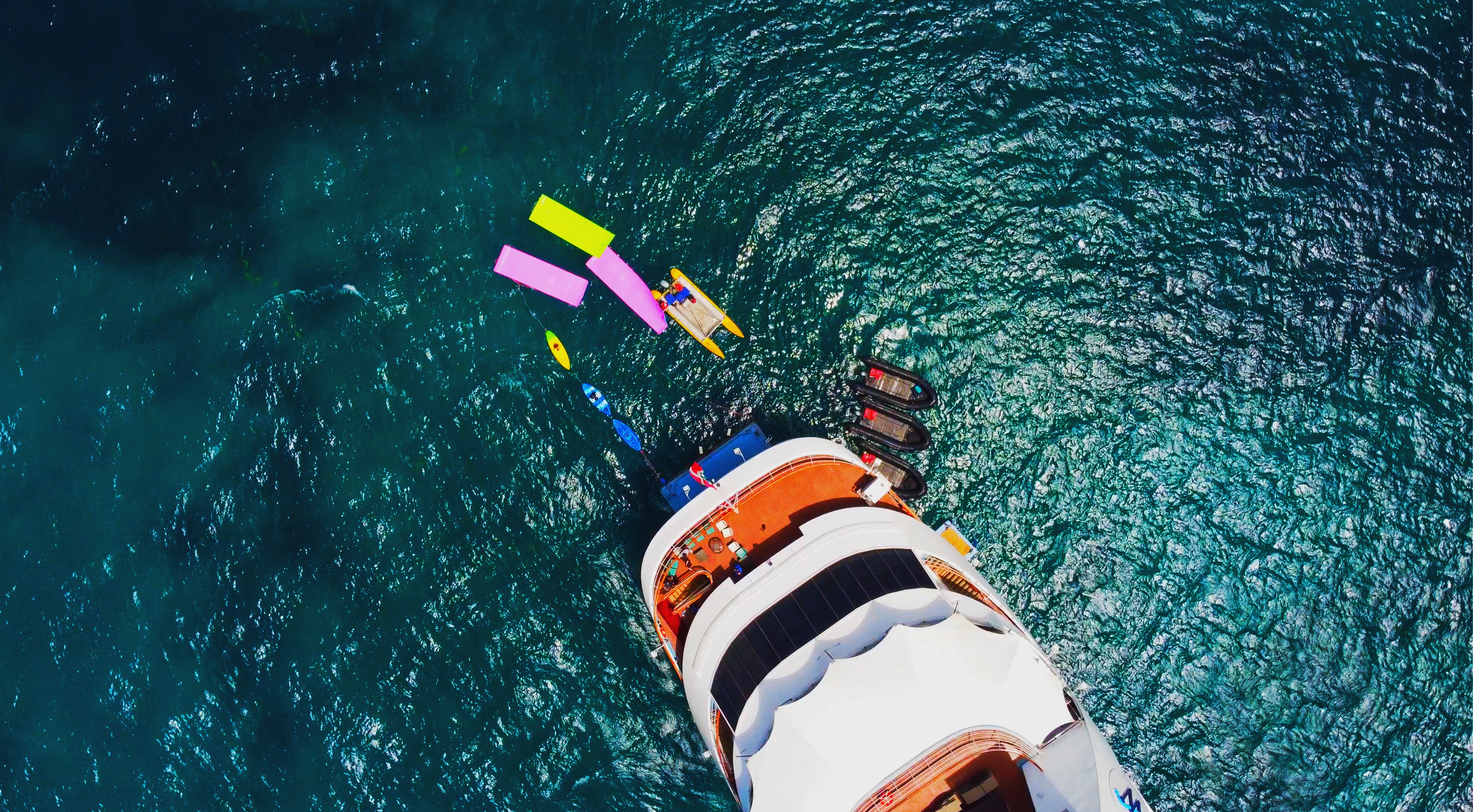
Sailings with Windstar include a lot of special amenities, but one of our most fun (and unique) is the Watersports Platform, which allows guests easy access to the ocean around them.
The platform exists on each of our six yachts and includes unlimited use of all water sports equipment including stand up paddle boarding, kayaking, snorkel equipment, sailing, swimming, water skiing, and windsurfing. If that all sounds like too much work for your vacation, a large foam flotation island is often unfurled into the sea, allowing guests to lounge, casually swim, and take in the view around them.
Use of the Platform is always weather permitting and only takes place in certain ports during each of our journeys in select regions. (check with the crew once on board for more details on where and when the platform will be open).
And don’t forget, there’s NO need to bring snorkel equipment on many Windstar cruises! We provide complimentary masks, fins, and snorkels during your first afternoon on board, so you can take that equipment with you when you’d like to go exploring on your own (or with a designated shore excursion). It even comes in a handy mesh bag. One less thing you have to pack when heading to paradise!
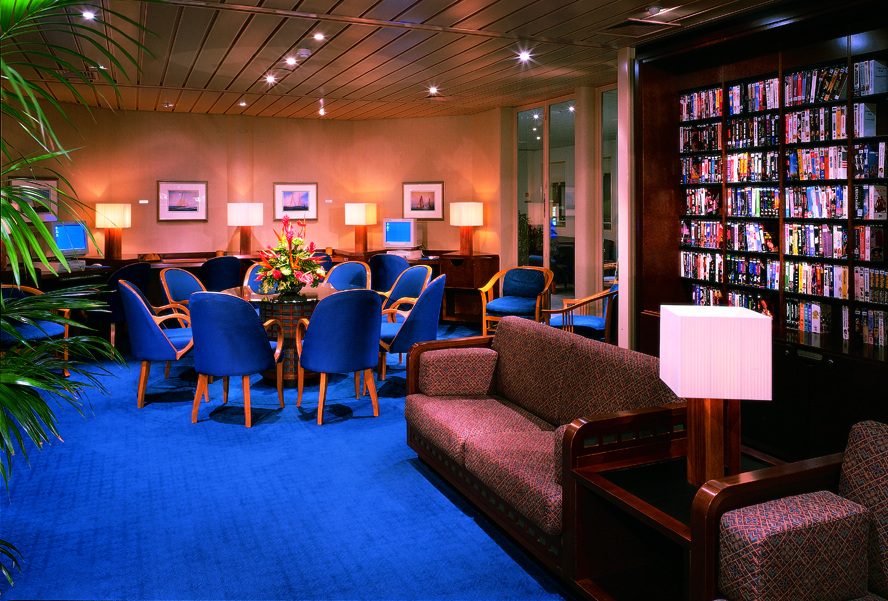
Onboard entertainment facilities include: a casino, a watersports platform, the Compass Rose Cocktail Bar, The Lounge, and The Terrace Bar.
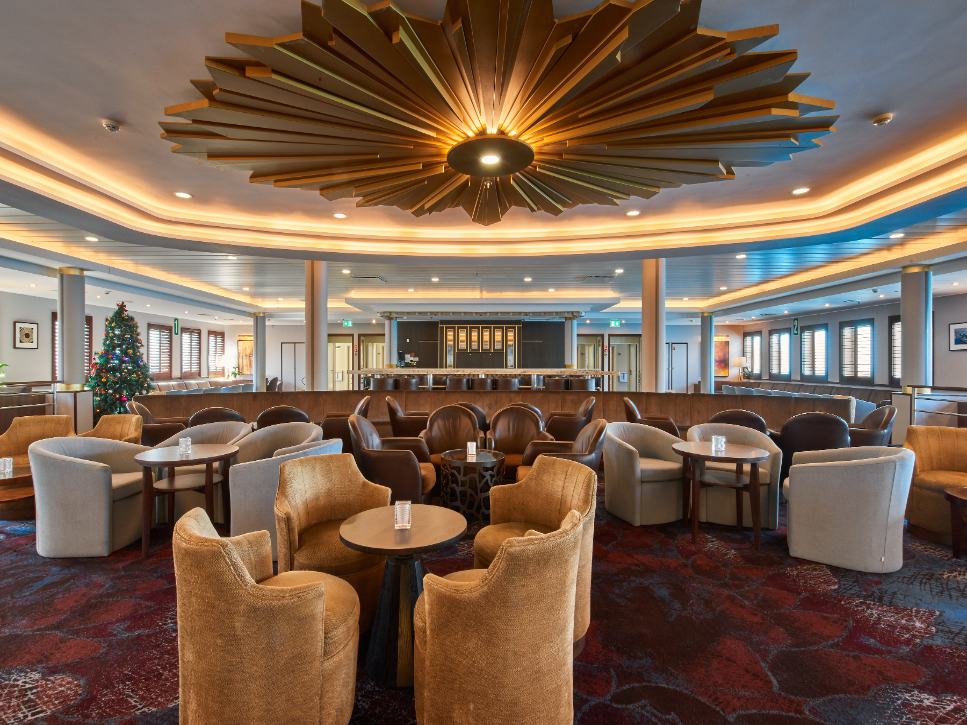
An expanded lounge with new lights and sound for upcoming stage performances.
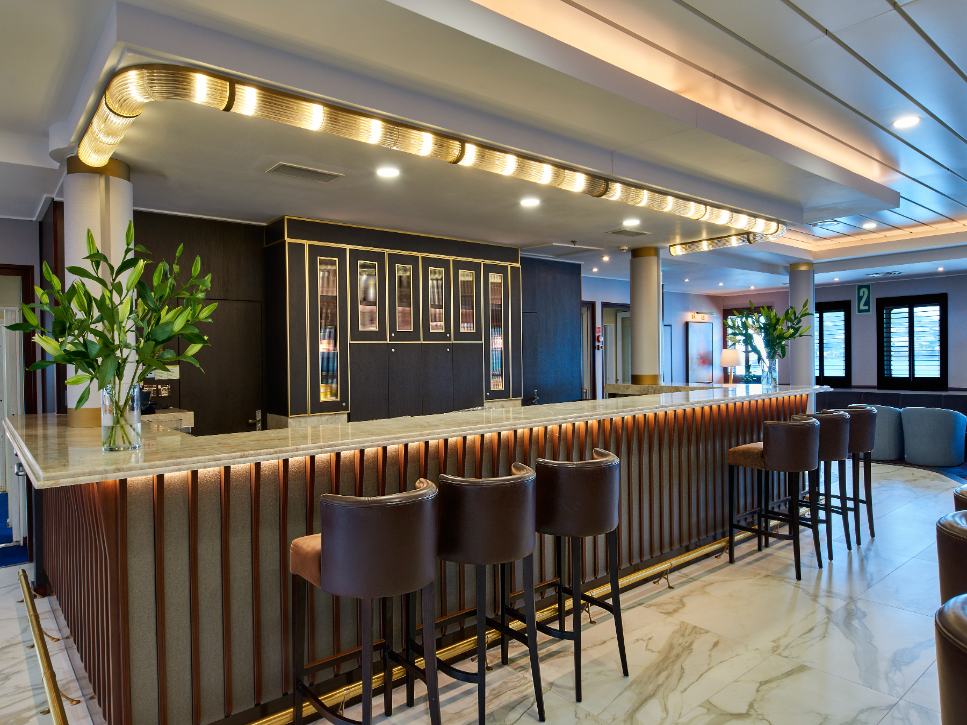
The Lounge Bar can be found on the Main Deck.
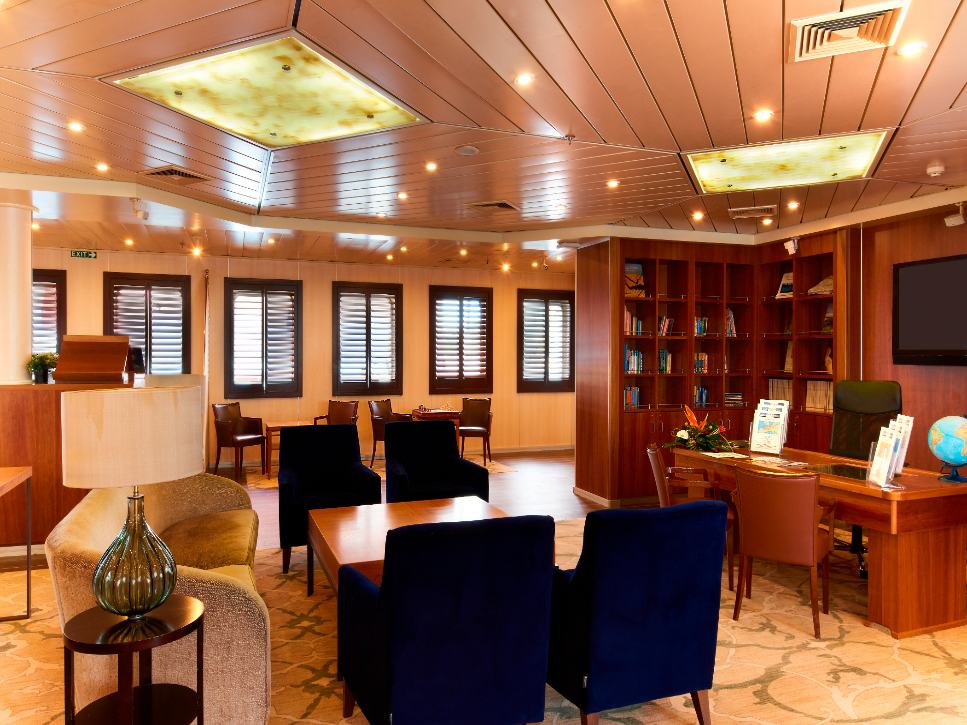
The Yacht Club Café can be found on the Main Deck.
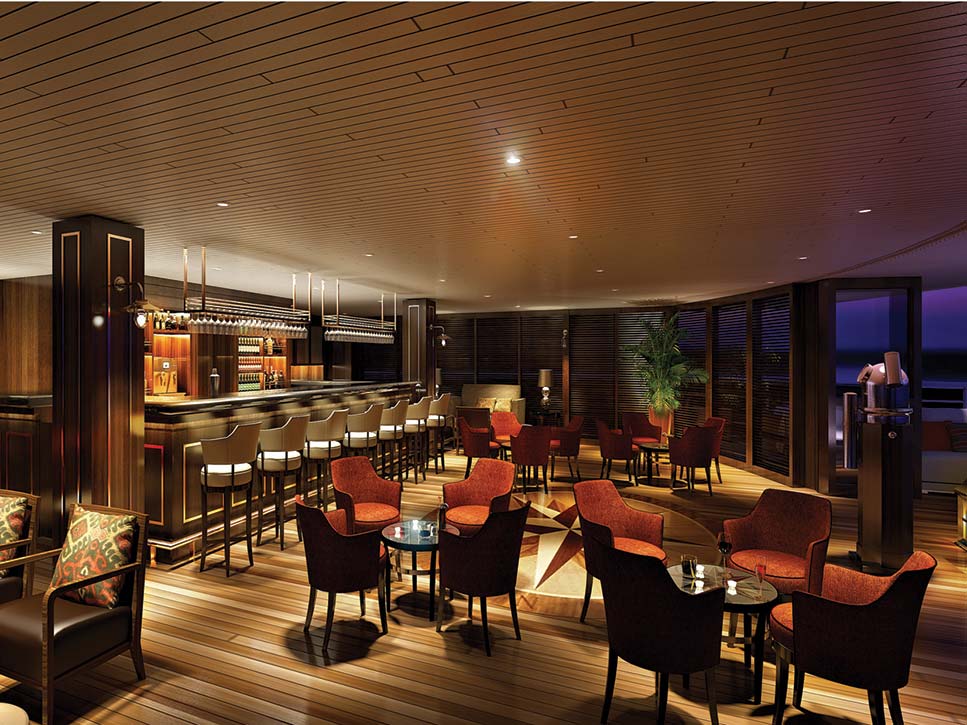
The Compass Rose Bar can be found on the Main Deck.
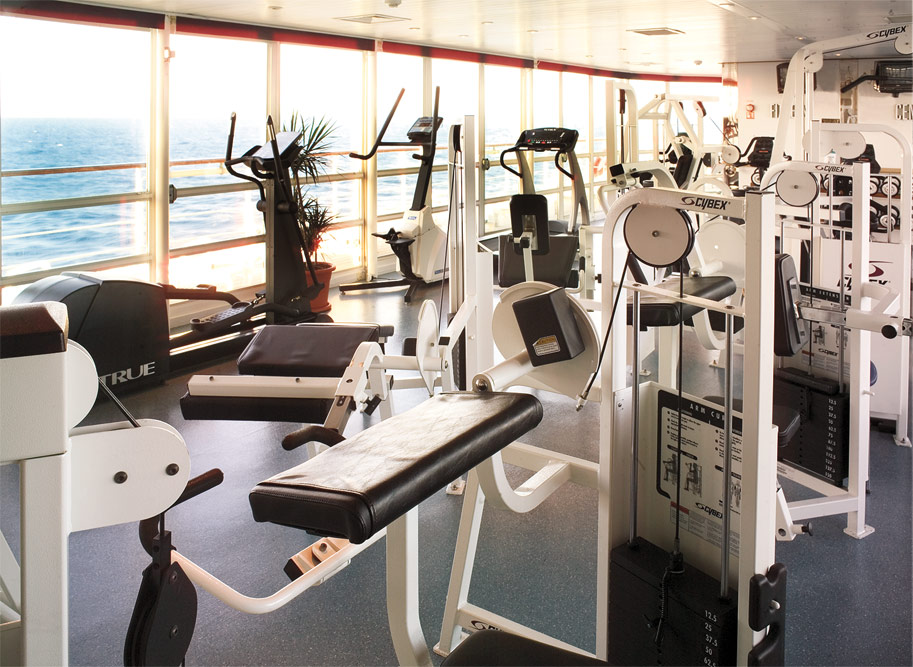
Health & Fitness facilities include a Fitness Centre, whirlpool, and swimming pool.
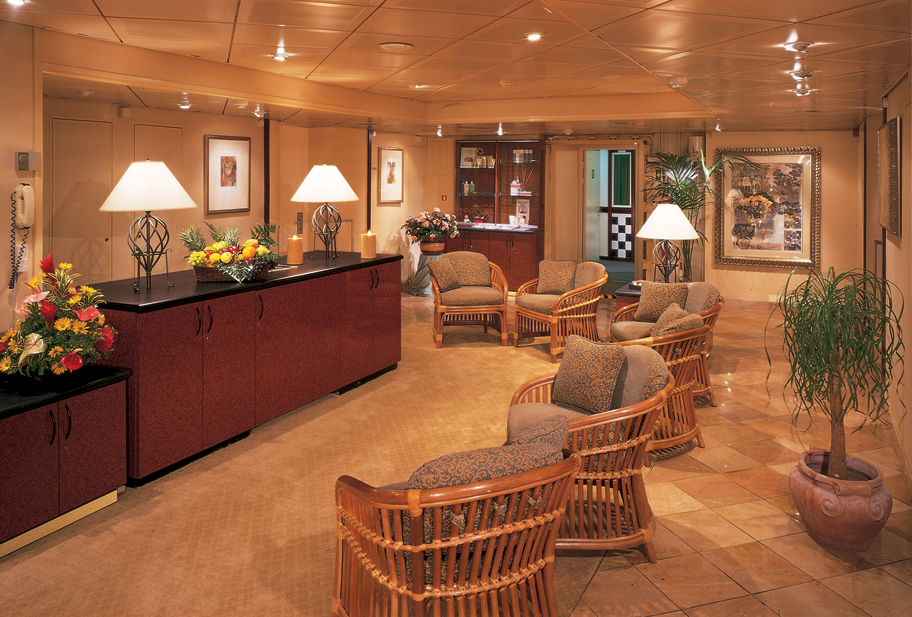
As you enter the hushed atmosphere of the newly-expanded WindSpa, you’ll feel every last care gently melt away. Maybe you’ll try a Hydralift facial or a new color on your toes. Maybe you’ll surrender to the transformative power of a relaxing massage. With one of the highest crew-to-passenger ratios at sea, you will find yourself in the enviable position of never having to lift a finger.
The crew is happy to do whatever we can to make your time on board as pampered as possible. Please book spa appointments with the hotel manager once you’ve boarded your yacht.
Windstar does not discriminate against persons on the basis of disability. We seek, to the extent feasible, to accommodate the needs of persons with disabilities. There are no elevators on Wind Star and Wind Spirit nor were the ships originally constructed to be wheelchair accessible. As a result, these ships may be unsuitable for people relying solely on wheelchairs. The other yachts are equipped with elevators, but staterooms on Wind Surf are not wheelchair accessible. Also note, there is no elevator access to board the ship. Star Pride, Star Breeze, and Star Legend have modified wheelchair accessible suites available.
Certain ports require the ship to anchor; in this case guests must be ferried into port. Service Dogs are permitted onboard ships if prior arrangements have been made at time of booking. In limited situations where an individual with a disability would be unable to satisfy certain specified safety and other criteria, even when provided with appropriate auxiliary aids and services, we may find it necessary to ask the individual to make alternative travel arrangements. It is essential that Windstar is notified of any special medical, physical or other requirements you may have at the time of booking.
Passengers under 21 years of age must be accompanied by a parent, guardian or chaperone who is at least 25 years old; one adult chaperone is required for every five people under 21. Parents, guardians, and chaperones are responsible for overseeing the onboard conduct of minors. Alcoholic beverages will not be served to passengers under age 21.
The intimate ship size and unregimented atmosphere are adult in orientation and do not provide for the care, supervision, or entertainment of children. Due to limited medical facilities, Windstar will not accept reservations for children under 8 years of age.
The less you bring the better. We suggest clothes that are light, cool, and made of natural fabrics like cotton and silk. You may wish to bring warmer clothing (layers are best), if you are traveling on an Ocean Crossing or an autumn Mediterranean cruise.
The Dress Code – from 7 am – 6 pm guests are welcome to dress as they please with the exception of no swimwear in all public lounges and restaurants and no clothing with offensive language or graphics that distract from the comfort and well-being of others. The general shipboard style is elegant, but relaxed including jeans and Bermuda/ walking shorts.
In the evening – after 6 pm when dining in Amphora, Stella Bistro or Cuadro 44 by Anthony Sasso, the dress code is country club-type clothing. For men – nice slacks, polo shirts, button down shirts, shoes other than athletic shoes. Designer denim jeans without rips or holes or are multi-colored are also acceptable. Sport coats are optional. Ties are not needed. For women – nice pants, skirts, tops, casual dresses, sundresses, nice sandals or casual shoes and designer denim dress jeans not ripped or multi-colored or having holes. Blazers are optional.
No assigned seating in Amphora or Veranda restaurants. And what can be more casual than merely signing for onboard purchases? You will feel like this is your ship, your personal yacht. The environment inspires the attitude. Reservations are required for Candles and can be made on board.
For those guests traveling to Alaska, it’s important to wear the right gear. We have partnered with the leading expedition outfitter to offer an online Alaska clothing and accessories service that ships directly to your ship. You’ll find all the right gear for Alaska, packing lists, clothing tips and our limited-edition Alaska inaugural season jacket here..
While all non-alcoholic beverages are complimentary, you may enjoy a pre-dinner cocktail under the setting sun or a champagne toast at the evening Sail Away with our beverage packages for wine, beer, cocktails and more. Find the perfect wine pairing with your meal and then end the night sipping scotch as you contemplate the stars.
Topmast Discoveries Beer & Wine Package – $49 per person per day An extensive package of diverse and intriguing wines from traditional European winegrowing terroirs to New World regions. Includes domestic and imported beer and 33 varieties of wine by the glass.
Captain’s Exclusive Beverage Package – $59 per person per day The ultimate beverage package and the perfect way to try new drinks for a bit of added adventure. Includes all domestic and imported beers and 33 varieties of wine/sparkling/champagne by the glass PLUS cordials, liqueurs, apertifs, cocktails and even mini bar items. (Cocktails based on house & select brands)
The All-In Package – From $79 per person per day. Have it all by making it an all-inclusive voyage with unlimited beer, wine & cocktails, unlimited Wi-Fi and gratuities, including the 15% beverage service charge. A convenient bundle that saves time and money, pays most of your expenses upfront and avoids the European VA Tax when pre-purchased. The All-In Package is sold per person and must be purchased up to 7 days prior to departure at $79.
The Topmast, Captain’s Exclusive and $89 All-In Packages are sold per person and must be purchased in advance or during the first 2 days of your cruise and for the full duration of the cruise. Prices for the Topmast and Captain’s Exclusive Packages do not include the standard 15% beverage service charge. Package prices are inclusive of applicable taxes. The minimum drinking age aboard Windstar Cruises is 21 years old.
Laundry service is provided on board at a nominal charge. Dry cleaning is not available. Laundry Service Packages must be added by the first day of the cruise and will be priced by the total number of cruise days. Pricing is inclusive of applicable taxes.
- All meals in all venues at all times, including room service menu available 24 hours
- All non-alcoholic beverages, including cappuccino, espresso, and other specialty non-alcoholic drinks
- Welcome cocktails at reception
- All onboard entertainment
- Unlimited use of Fitness Center
- Unlimited use of all water sports equipment
- Informative nightly port talks and destination briefings
Here at Windstar we are committed to offering our guests healthy food selections. We offer vegetarian selections and lighter fare options, seeking to provide the freshest, top quality foods handled with the utmost care. If you have food allergies or special dietary needs, there are several ways to notify us prior to boarding the ship.
It’s important to let us know about your special request when you book your cruise to help us plan and prepare for your meals. Your travel professional will enter this information in Special Requests. It is then noted on your booking and your ship will be notified, although it will not appear on your invoice or in My Windstar.
Special Request Dietary Needs include:
- Alcohol Free
- Celiac
- Dairy Free
- Diabetic – Diet Controlled
- Diabetic – Insulin Controlled
- Food Allergy
- Gluten Free
- Lactose Intolerant
- Low Carbohydrate
- Low Cholesterol
- Low Protein
- Low Sodium
- Other Dietary
- Sugar Free
- Vegan
- Vegetarian
- Wheat Free Diet
Unfortunately we are unable to accommodate Kosher or Halal meals. If you have specific dietary needs– such as – lactose intolerant requiring almond milk – please complete a Special Requirements Information Form. Return this information via:
1. Mail to Windstar Vacation Planning at 2101 4th Ave., Suite 210, Seattle WA 98121
2. Fax to 206-733-2790
3. Call 866-568-0982 to speak with a Vacation Planner in person
4. Send an email to info@windstarcruises.com
When you embark the ship please feel free to ask to speak with the Executive Chef about your specific request.
If you have any additional questions or concerns please call us during business hours at 866-568-0982.
Smoking or vaping is not permitted in any of the staterooms, suites, or public spaces, including all restaurants and corridors. Smoking and vaping is permitted on the outside decks in designated smoking areas only. Smoking cigars is permitted in a specific designated area on each yacht, however, only sold on board the Cigar Room of Wind Surf.
Windstar Cruises offers full internet capabilities, depending on course and position of the ship, as well as wireless internet service on all ships. Wi-Fi access is possible in most public areas, staterooms, and suites.
Internet Usage Plans
The Email Plan $60
This plan gives you 200 MB of data to use during your cruise. This plan is recommended for people who will be checking email and doing very limited browsing. The estimated minutes range from 15 to 60.
The Surfing Plan $120
This plan gives you 500 MB of data to use for additional browsing and small file transfers (such as posting pictures to a social media site). The estimated minutes range from 90 to 360 (approximately 5 hours).
The Unlimited Plan
Unlimited Internet Package
- 7 Day Cost $250
- 8 Day Cost $280
- 9 Day Cost $315
- 10 Day Cost $350
- 11 Day Cost $385
- 14 Day Cost $490
- 15 Day Cost $525

- Stella Bistro (2)
- The Veranda / Candles (5)
- Fitness Centre (10)
- Terrace Bar (17)

- Bridge (1)
- Bridge Suites (4)
- Compass Rose Bar (11)
- Windspa (13)

- Amphora Restaurant (3)
- Lounge (8)
- Yacht Club Café (9)
- Reception (12)
- Star Boutique (14)
- Pool / Pool Bar / Whirlpools (15)

- Suites and Staterooms (6)

- Watersports Platform (16)
- Staterooms (7)

- Staterooms (7)

